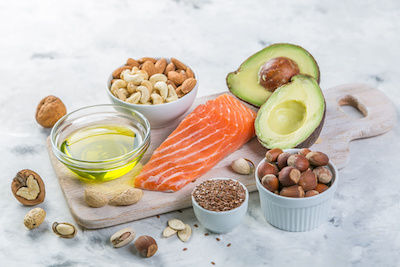
A lot of the information you find on weight management carries the same scientific heft as the blank pages you’d waste printing it out. The Internet wasn’t where weight myths started, though—not by a long shot. But weight-related misconceptions flourish in the fertile ground of today’s online ecosystem.
Physical and lifestyle realities make modern-day weight-management efforts hard enough. Add in the mountain of weight misinformation burying people’s best efforts, and you have a Herculean task.
But you can manage your weight to live a healthy, happy life. It starts with knowing fact from fiction. Clearing up six of the most pervasive weight myths is a good start. Read on to see which weight-related misconceptions you can toss aside to lighten the load of advice for staying healthy.
The Scale Says It All—Body Weight is Key to Your Health
It’s correct to connect higher-than-normal body weight with a broad range of undesirable health impacts. This is especially true when the added heft comes from accumulated body fat.
And body composition is certainly an element to consider when stepping on the scale. You’ve heard that muscle weights more than fat, which is true. Same goes for bone and water, too. So, that number on the scale doesn’t tell you everything you need to know.
Weight alone is a consideration, but your body composition is an important factor in evaluating what that scale number means for your health. Instead of buying this weight myth, put context around the measurements you’re doing. Also know that your body weight is only one piece of a big, complex health puzzle.
BMI is an Essential, Accurate Measurement
Body Mass Index (BMI) is somewhat useful in evaluating where you fall on the spectrum of healthy, overweight, and obese. But calling it a standard-bearing measurement, without realizing BMI’s shortcomings, spins this statement into a popular weight-related misconception. And one that can create unnecessary negative pressure on many people.
The simplicity of BMI—putting your height and weight into an equation that reveals your number—makes it a one-size-fits-all approach. Unfortunately, weight is an issue that’s highly personalized and incredibly variable. Here are two ways BMI’s oversimplification make its elevated importance a weight myth:
- Body composition isn’t considered. How much fat you have compared to muscle, bone, and water is—as you read about with the last weight-related misconception—essential context when discussing weight.
- The approach sidelines important demographic information like sex, race, ethnicity, and age.
Waist measurements (especially when related to height) are better, more accurate indicators of health risks related to body weight. It’s time you move on from relying solely on BMI—an outdated and inaccurate measurement—to make health decisions.
High Body Weight Signals Inactivity and Lack of Athletic Ability
This weight-related misconception is a common and painful bias that springs from bad information. Since many looking to lose weight turn to exercise, there’s a harmful conflation of physical activity and body weight.
As weight myths go, this one is particularly hurtful for those stereotyped by the way their bodies look. Just because someone looks to be carrying around a few extra pounds doesn’t mean they’re lazy or lack athletic ability.
How do you fight this weight-related misconception? Remember the most important statement: Bodies of all shapes and sizes can be—and frequently are—healthy.
Exercise Saves You from Bad Dietary Decisions
You may have read about the distance you need to run to burn off a big meal. They’re shocking numbers that underline why diet and exercise are talked about in combination.
Your bad dietary decisions will follow you to the gym—and likely long after. You can burn the calories you take in if you have the time to do it. However, this idea is best considered a weight myth because it’s not possible for almost anyone to balance out a bad diet with enormous amounts of exercise.
The truth is a successful weight-management plan needs to include a healthy diet AND consistent body movement.
Skinny Always Means Healthy and Being Thin is Ideal
Thin is always in when it comes fashion or pop culture. But a skinny body signaling ideal health is a major weight myth.
Staying fit and maintaining a healthy weight are beneficial to your health—as you’ve read so many times. But fretting over clothing sizes and wanting a thin image reflected in the mirror aren’t as important. Actually, a skinny silhouette can hide a bevy of issues, including the accumulation of harmful visceral fat.
This is one of the most damaging weight-related misconceptions. That’s because the unreal, unhealthy expectations set by “thin is ideal” images are—despite body-positive progress—still too prevalent.
Some body types don’t allow for anyone to meet these false ideals—no matter how hard a person tries. And the quest to look skinny is frequently very harmful for the physical and mental health of children and adults alike.
Instead, focus on what feels right for your body and your health goals. Eat healthy. Move your body. Sleep plenty. And always keep in mind that bodies are healthy and attractive in different sizes and shapes that may not match pop culture’s obsession with skinny.
Eating Fat Makes You Gain Fat Tissue

If you understand anything about how digestion breaks down dietary nutrients, you know this is an easily debunked weight myth.
Your digestive system does too much work, and your food goes through too much transformation, for the dietary fat you eat to turn straight into fat tissue. Sure, your body can store energy that was originally fat in adipose tissue (a fancy term for fat). But there’s no guarantee fat in means fat stored.
Skipping fried foods or fat-rich, nutrient-poor dishes are good ideas. But it’s worse to avoid eating fat at all—especially beneficial, plant-based options. Loading up on a balanced diet with plenty of plants is more effective for health and weight management.
Don’t Let Weight Myths Determine Your Health Journey
There’s always new, attention-grabbing content waiting when you want to read about weight. That doesn’t mean you have to buy into the weight-related misconceptions out there.
The basics of foundational health—a balanced diet, active living, minimal stress, solid hydration, and good sleep—are typically also beneficial for managing your weight. Everything else that offers a one-size-fits-all solution should raise a red flag about the advice or information possibly pushing a weight myth.
Avoid tripping yourself up with weight-related misconceptions by focusing on the basics and remembering that all bodies can be healthy, happy bodies.
Article Source: https://askthescientists.com/weight-misconceptions/?id=13550953&source=copiedlink
Comments
Post a Comment